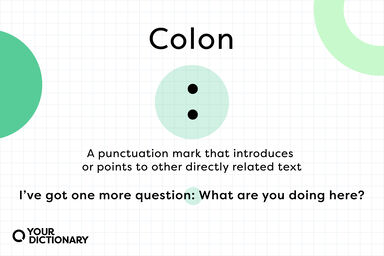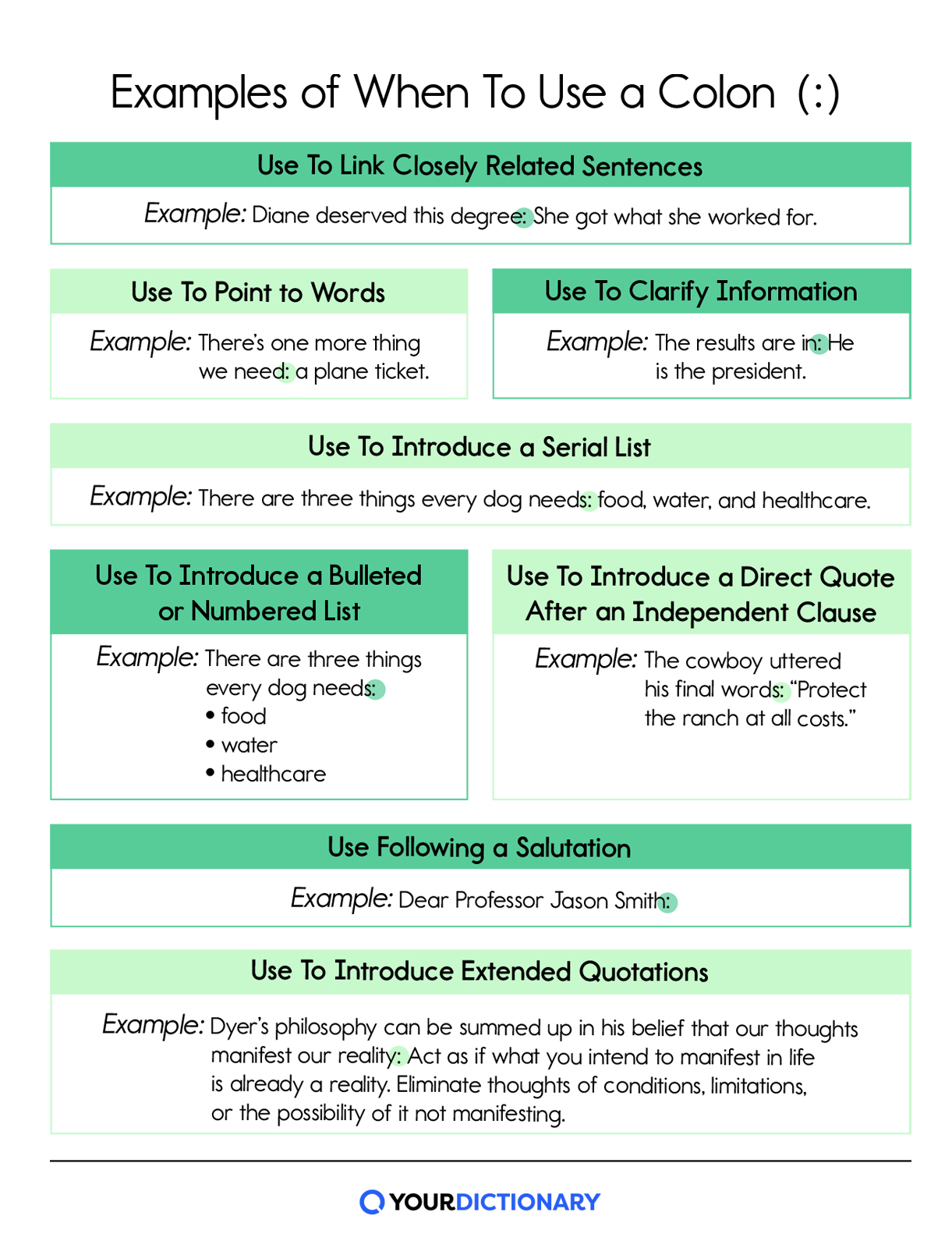Shoudl the Underline Continue Under the Colon
How and When To Use a Colon ( : )
Hearing "There's a problem with your colon" is never good news, though it's probably worse coming from your doctor than from your English teacher. Luckily, when talking about punctuation, a few tips and hints can help you straighten out any colon-related problems (in your writing).
 definition of colon symbol in grammar with example sentence from the article
definition of colon symbol in grammar with example sentence from the article
What Is a Colon?
A colon is a punctuation mark that introduces or points to other directly related text. It looks like two dots, one on top of the other (:) and always has a space after it.
Colons come after independent clauses. They can't split a noun from a verb, and they can't break up a clause or a phrase. However, the words after a colon can be a complete thought, an incomplete thought, a list of words, or even a single word.
Examples of Colons in a Sentence
Colons have many functions in a sentence. They can often stand in for the phrases such as or which is to introduce lists or emphasize a point.
- I've got one more question: What are you doing here?
- There are five people in my department: Jessica, Raul, Sean, Jamal, and me.
- We moved here for one reason: opportunity.
- Maribel stood and announced: "We're having a baby."
- To Whom It May Concern: I visited your restaurant yesterday, and I have a complaint.
Do You Capitalize After a Colon?
One tricky question concerns capitalization after a colon. You only capitalize after a semicolon if the first word is a proper noun — so does the same rule apply with a colon?
It depends on your style guide. All style guides capitalize the first word after a colon if it's a proper noun or the beginning of a quotation. But only AP style and APA style recommend capitalizing the first letter after the colon if it's the beginning of a full sentence.
- Mary was shocked: She never expected to see Nate again.
- The jar was empty: Mike had eaten the last cookie.
The Chicago Manual of Style and MLA format recommend capitalizing the first letter after the colon only if it introduces two sentences, not just one.
- Mary was shocked: She never expected to see Nate again. Not here, of all places.
- The jar was empty: Mike had eaten the last cookie. Kelly's stomach grumbled with hunger and irritation.
How To Use a Colon
Now that the mystery of guts vs. grammar is behind us, it's time to focus on the most mysterious part of colons: their usage. While colon rules may seem random to readers, there are several correct ways to use them in a sentence — and several times when choosing another punctuation mark might improve your writing even more.

View & Download PDF
Use a Colon To Link Closely Related Sentences
When two sentences are directly related, you can connect them with a colon. It provides more of a pause than a comma or semicolon, but less of a pause than a period.
- Thinking back, our trip to Ireland was the best: We saw some of the most beautiful terrains this Earth has to offer.
- Diane deserved this degree: She got what she worked for.
Use a Colon To Point to Words
A colon also can function like an arrow, telling readers "Look at this word!" Typically, only one word or phrase follows a colon in these sentences.
- There's one more thing we need: a plane ticket.
- I've met the love of my life: Patricia Perez.
Use a Colon To Clarify Information
Use colons between two sentences if the second sentence explains more about the first sentence. Note that both sides of the colon are complete sentences with this usage.
- Life is like a road: Every path takes you somewhere.
- The results are in: He is the president.
Use a Colon To Introduce a Serial List
When a serial list somes after an independent clause, you can use a colon to stand in for the phrases which include or which are.
- There are three things every dog needs: food, water, and healthcare.
- For the camping trip, you need to pack many things: clothing, sleeping bags, food, utensils, and cookware.
Avoid splitting up a phrase or clause with the colon in these cases. The colon should only come after a complete sentence, and before the list of items. Don't add a colon after phrases like such as, for example, or we need.
- Incorrect - We need: eggs, milk, and fabric softener.
- Correct - We need the following items: eggs, milk, and, fabric softener.
- Also correct - We need eggs, milk, and fabric softener.
Use a Colon To Introduce a Bulleted or Numbered List
If items appear in bullets or numbers rather than in a sentence, you can use a colon to introduce them as well. Just be sure that the sentence before the colon is an independent clause.
- There are three things every dog needs:
- food
- water
- healthcare
- For the camping trip, you need to pack many things:
- clothing
- sleeping bags
- food
- utensils
- cookware
Capitalization and ending punctuation are optional for single words or short phrases in bullet points or numbered lists.
Use a Colon To Introduce Extended Quotations
When providing an extended quotation (more than a few sentences) in your writing, add a colon after the sentence that introduces the quote. Then indent the quotation from the left margin, and don't use quotation marks.
Dyer's philosophy can be summed up in his belief that our thoughts manifest our reality:
Act as if what you intend to manifest in life is already a reality. Eliminate thoughts of conditions, limitations, or the possibility of it not manifesting. If left undisturbed in your mind and in the mind of intention simultaneously, it will germinate in the physical world.
Use a Colon for Shorter Quotes
You can also use a colon instead of a comma to introduce a direct quote after an independent clause (though you should use a comma if the sentence before isn't a complete sentence).
- My father always used to tell me: "Being kind to one other is the deepest type of love."
- The cowboy uttered his final words: "Protect the ranch at all costs."
Use a Colon Following a Salutation
You can also use a colon after the salutation in a formal letter, such as To Whom It May Concern. When addressing someone by their name in a formal way, you can also use a colon.
- To Whom It May Concern:
- Dear Mr. Wilson:
- Dear Professor Jason Smith:
When Should You Use a Semicolon Instead of a Colon?
Semicolons are similar to colons, but they don't provide as much of a pause or emphasis. Semicolons typically join independent clauses together — just one of the many functions of a colon.
The only time when you may want to use a semicolon instead of a colon is if your independent clauses are only loosely related, not directly related.
- I hate ironing: I never do it right. (The clauses are directly related — use a colon)
- I hate ironing; I also can't stand sweeping. (The clauses are loosely related — use a semicolon)
- Nataliya is so talented: She can play three instruments. (The clauses are directly related — use a colon)
- Nataliya is so talented; she's definitely going to win the music competition. (The clauses are loosely related — use a semicolon)
Why Is It Called a Colon?
Depending on the context of the sentence, colon could refer to the large intestine or the colon symbol we know and love. But how can one word refer to two really, really different things?
They're not as different as you think. The word colon comes from the Latin colon ("section, passage") and the Greek kōlon ("limb, part"). With a slight change in pronunciation, kolon (no line over the "o") means "meat" — so the large intestine is a "passage of meat."
In the same way, the grammatical colon used to refer to a "passage of writing" — similar to the modern word clause. Over time, colon began to describe the dotted colon symbol used to set off a clause, rather than the clause itself.
Place the Colon Quiz
Read the following sentences and decide where you would put a colon. (Here's a hint: Some sentences don't need a colon at all.)
- My sister moved away, she couldn't stand the cold weather here.
- Please bring sunscreen, sandals, and pool toys to the swim party.
- There's one food I can't stand, pickles.
- "Don't call me again," yelled Violet.
- There's a storm coming, you should find shelter.
- Patty announced "I quit."
Place the Colon Quiz Answer Key
Could you place those cool colons correctly?
- My sister moved away: She couldn't stand the cold weather here. (Colon connects two clauses)
- Please bring sunscreen, sandals, and pool toys to the swim party. (No colon needed)
- There's one food I can't stand: pickles. (Colon emphasizes pickles )
- "Don't call me again," yelled Violet. (No colon needed)
- There's a storm coming: You should find shelter. (Colon connects two clauses)
- Patty announced: "I quit." (Colon introduces the quote)
Source: https://grammar.yourdictionary.com/punctuation/grammar-colon-usage.html